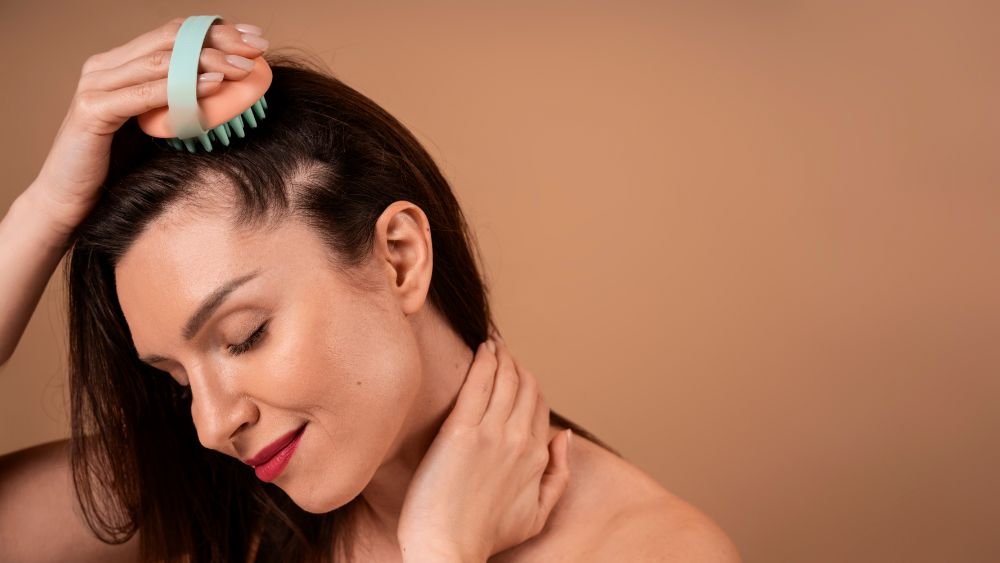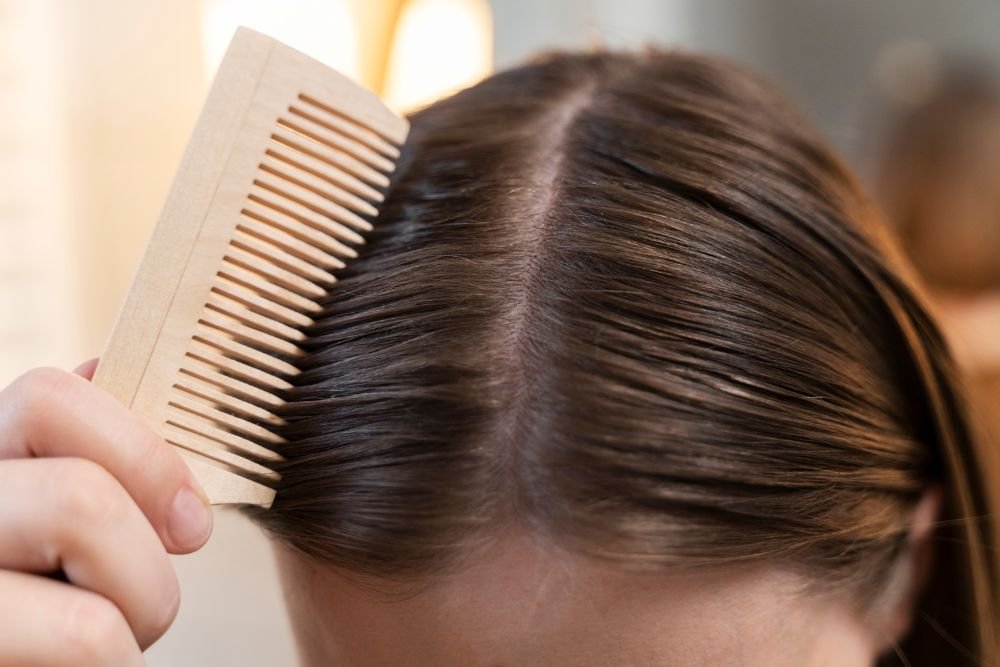Are you tired of dealing with the pesky bumps and itchiness on your scalp? You’re not alone! Folliculitis Hair Scalp can be a frustrating issue for many, but fear not – we’ve got you covered with simple and effective solutions to calm your irritated scalp and boost your confidence.
Table of Contents
Understanding Folliculitis Hair Scalp
Scalp folliculitis, also known as “folliculitis hair scalp,” is a common skin condition characterized by inflammation of the hair follicles on the scalp.
It can manifest as small, red bumps that may be itchy or tender to the touch. While it’s usually not serious, it can be bothersome and impact your quality of life.
The Impact on Women’s Self-Esteem
One of the biggest challenges of dealing with scalp folliculitis is its impact on self-esteem, especially for women. The visible symptoms can make you feel self-conscious and affect your confidence.
However, it’s essential to remember that you’re not alone in this journey, and there are steps you can take to manage the condition and boost your self-esteem.
Scalp Folliculitis: Your Ultimate Guide to Relief and Confidence
1. Gentle Scalp Care: Nurturing Your Scalp
Taking care of your scalp is key to managing folliculitis effectively. Here are some gentle scalp care tips to incorporate into your routine:
- Regular Washing: Wash your hair regularly (every 1-2 days) with a mild, fragrance-free shampoo to keep your scalp clean and free from buildup.
- Avoid Harsh Scrubbing: Be gentle when washing your scalp to avoid irritating the hair follicles. Avoid tight hairstyles that can pull on the scalp and exacerbate folliculitis.
- Lukewarm Water: Use lukewarm water for rinsing your hair instead of hot water, as hot water can strip away natural oils and dry out the scalp.
- Pat Dry: After washing your hair, gently pat your scalp dry with a soft towel instead of rubbing vigorously, which can further irritate the follicles.
Taking these simple steps can help soothe your scalp and reduce inflammation, allowing your hair follicles to heal.
2. Scalp Exfoliation: Removing Dead Skin Cells

Exfoliating your scalp can help remove dead skin cells and unclog hair follicles, reducing the risk of folliculitis. Here’s how to do it effectively:
- Use a Gentle Scrub: Look for a scalp scrub containing ingredients like salicylic acid or tea tree oil, which have anti-inflammatory properties and can help reduce scalp irritation.
- Apply Once or Twice a Week: Incorporate scalp exfoliation into your routine once or twice a week to prevent buildup and promote healthy hair growth.
- Massage Gently: Massage the scrub into your scalp using gentle circular motions, focusing on areas prone to folliculitis. Rinse thoroughly with lukewarm water.
By exfoliating your scalp regularly, you can improve circulation, reduce inflammation, and promote healthier hair follicles.
3. Additional Tips for Managing Scalp Folliculitis: Going the Extra Mile
In addition to the basic care and soothing solutions mentioned earlier, there are some advanced strategies you can try to further manage scalp folliculitis and promote scalp health:
- Apple Cider Vinegar (ACV) Rinse: Apple cider vinegar has antimicrobial properties and can help balance the pH of the scalp. Mix equal parts of water and ACV, apply it to your scalp after shampooing, leave it on for a few minutes, then rinse thoroughly. Start with a diluted solution to avoid irritation.
- Aloe Vera Gel: Aloe vera has soothing and anti-inflammatory properties that can help reduce scalp irritation and promote healing. Apply pure aloe vera gel directly to affected areas of the scalp and leave it on for 20-30 minutes before rinsing off.
By incorporating these additional tips into your scalp care routine, you can take your folliculitis management to the next level and enjoy a healthier, happier scalp.
Sarah struggled with thinning hair and scalp issues until she found our all-natural balsam. Within weeks, her scalp felt rejuvenated, her hair appeared thicker, and her confidence soared.
Thisexclusive formula keeps the scalp free of heavy metals, chemicals, and toxins, promoting optimal hair growth and scalp health.
Ready to experience the transformative benefits? Click here to learn more and start your journey to healthier hair.
4. Science-Backed Soothing Solutions: Finding Relief
In addition to gentle scalp care and exfoliation, there are science-backed solutions that can help soothe scalp folliculitis and promote healing:
- Tea Tree Oil: Tea tree oil has antimicrobial properties that can help fight the bacteria responsible for folliculitis. Look for shampoos containing diluted tea tree oil or dilute it yourself with a carrier oil like jojoba for spot treatment.
- Oatmeal Baths: Oatmeal has anti-inflammatory and moisturizing properties that can soothe itchy scalp. Try adding ground oatmeal to lukewarm bathwater and soaking for 15-20 minutes to relieve scalp irritation.
Incorporating these soothing solutions into your routine can provide relief from scalp folliculitis and promote a healthier scalp.
5. Impact on Self-Esteem: Embracing Confidence

Dealing with scalp folliculitis can take a toll on your self-esteem, but it’s important to remember that you are more than your skin condition. Here are some tips for boosting your confidence:
- Seek Support: Reach out to friends, family, or support groups who can offer understanding and encouragement. Talking about your feelings can help alleviate stress and improve your mood.
- Practice Self-Compassion: Be kind to yourself and practice self-compassion as you navigate the challenges of scalp folliculitis. Treat yourself with the same level of understanding and care that you would offer to a loved one facing a similar situation.
- Positive Affirmations: Start your day with positive affirmations to uplift your spirits and cultivate a positive mindset. Repeat phrases like “I am beautiful,” “I am strong,” and “I am worthy of love and respect” to reinforce positive self-talk.
- Set Realistic Goals: Set achievable goals for yourself and celebrate your accomplishments, no matter how small. Recognize your strengths and abilities, and acknowledge the progress you’ve made on your journey to managing scalp folliculitis.
- Practice Gratitude: Take time each day to reflect on the things you’re grateful for, whether it’s your supportive friends and family, the beauty of nature, or the little joys in life. Cultivating an attitude of gratitude can shift your focus from what you lack to what you have, boosting your overall happiness and well-being.
By prioritizing self-esteem support and nurturing your inner beauty, you can cultivate confidence and resilience in the face of scalp folliculitis and other challenges life may throw your way.
Conclusion: Embracing Confidence and Beauty
Scalp folliculitis may present challenges, but it doesn’t define who you are. With the right care, support, and mindset, you can manage the condition effectively and embrace your natural beauty with confidence.
Remember to be gentle with yourself, seek support when needed, and celebrate your unique qualities and strengths. By prioritizing self-care and self-love, you can shine brightly, inside and out.
In conclusion, managing scalp folliculitis is not just about finding relief from physical symptoms but also about nurturing your self-esteem and confidence. By incorporating these tips and strategies into your routine, you can achieve both healthier hair and a happier mindset.





